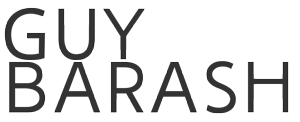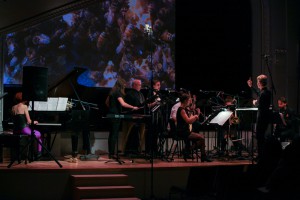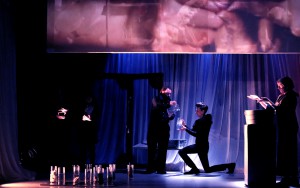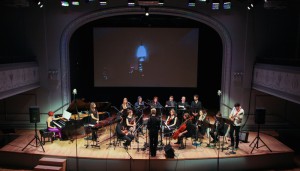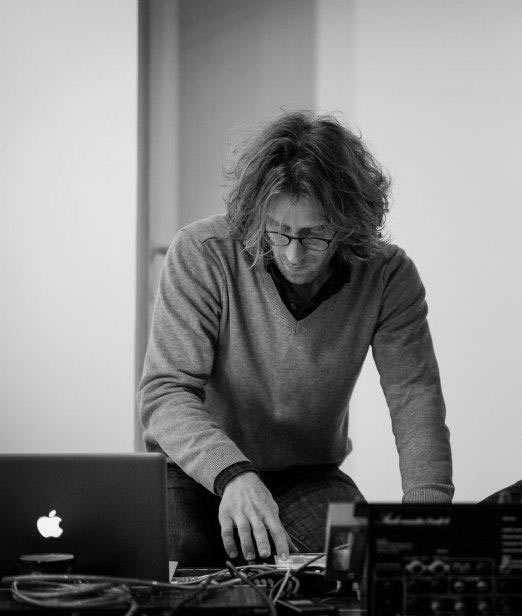
Photo: Nitai Levi
“A fascinating composer…”
— Kurt Gottschalk, Time Out New York
Fearless in his quest for uncovering sonic beauty in unexpected places, Israeli composer Guy Barash abandons the confines of genre, inventing a sound world that is uniquely his own. Often juxtaposing improvised materials with composed ones, Barash creates multi-metric environments in which he explores the perception of time and memory. He commonly applies electronic processing to acoustic instruments, and employs microtonality to create psychologically disorienting atmospheres.
While the music of European postwar avant-garde composers informs his aesthetic, the rawness of rock, punk and jazz, as well as an electroacoustic mindset enriches Barash’s palette and inspires his perspective. His remarkably diverse oeuvre includes orchestral, chamber, vocal, and electroacoustic compositions, as well as music for theater. He displays comfort with both traditional and non-Western instruments alike, and his aesthetic often corresponds with extramusical sources such as film, poetry, and visual art.
He is “a risk-taker, willing to pull ideas from all disciplines as he jumps into the unknown.” (icareifyoulisten.com) Frequently developing innovative, multidisciplinary projects, Barash collaborates with a wide array of artists including poets, video-artists, musicians and choreographers. In 2007, he conceived the interactive installation Manifests, Orders, Notifications involving guided improvisation for dancer Adi Kahana and real-time electronics, with Kahana triggering and manipulating audio material via passive-infrared and proximity sensors. His most recent collaboration with American author Nick Flynn has produced a number of provocative works. Proteus, a musical rendering of selected texts and excerpts from Flynn’s second memoir, The Ticking Is The Bomb, received its world premiere at Galapagos Art Space in February 2010; while Blind Huber, commissioned by the Jerome Foundation as part of Barash’s 2011 composer-residency at Electronic Music Foundation, is based on seven poems from the eponymous book by Flynn and was premiered in the fall of 2011 at Greenwich House alongside video projections by Jared Handelsman. Barash’s most recent collaboration was for his captivating new opera Alice Invents a Little Game and Alice Always Wins (currently in development) based on Flynn’s play. An excerpt from the opera was recently performed at the Metropolitan Opera Guild’s Exploring 20th-Century Opera lecture series. Additional highlights were presented at Fort Worth Opera’s Frontiers 2016 showcase.
As “a compelling composer/sound artist [who is] already making some serious contributions to the New York new music scene,” (Urban Modes) Barash receives awards, critical acclaim, and makes waves with frequent residencies and performances of his work. His music appears this season at NYC’s La MaMa Theatre, Tenri Cultural Center, and National Sawdust among other venues, and he makes his debut in Japan with a new work for bass clarinet, shakuhachi, koto, shamisen, and marimba, which will premiere at Tokyo Opera City’s Ohmi Gakudo in April 2017.
In anticipation for the release of his much talked about debut album Facts About Water on Innova Recordings in May 2014, music by Guy Barash was featured on Alex Ross’ influential blog The Rest is Noise. Reviewers recognized that the album is perfect “for the adventurous listener looking for something REALLY new,” (Jazz Weekly) and commented that “the combination of various worlds of outness [is] compelling.” (Classical-Modern Music Review) The release of the album was celebrated at a special portrait concert held at Roulette in Brooklyn. Since then his music has been released on labels such as Delos Music, Starkland, and most recently, the recording of Killdeer, on New Focus Recordings.
His series of compositions for solo instruments and real-time digital signal processing, Talkback, was hailed as being “at once divine, serene and haunting.” (The Queens Chronicle) It has been performed internationally by such illustrious musicians as clarinetist Thomas Piercy, violinist Cornelius Dufallo, guitarist Nadav Lev, pianists Kathleen Supové and Stéphane Ginsburg, cellist Kate Dillingham, trombonist William Lang, and soprano Jamie Jordan. The latest Talkback for timpani will be premiered by percussionist Makoto Aruga in Tokyo in Spring 2024.
Other recent accolades include a fellowship through American Opera Projects’ Composers & the Voice program, composer-in-residence position at Turtle Bay Music School, and Exploring the Metropolis’ Con Edison Composition Award. He has also been the recipient of numerous ASCAP Plus Awards, a composer grant through NYFA, and was also just recently appointed Artistic Director of one of the most active collectives of composers and performers in the country, Random Access Music, which, in addition to a lively concert season, also produces the annual Queens New Music Festival.
The performance of Barash’s String Quartet No. 1 Wrong Ocean by Momenta Quartet at the 2015 MATA Festival at The Kitchen was described as “a rhythmically vital evocation of rough waves and tidal forces.” (The Wall Street Journal) It was praised as “a kinetic, ten-movement flurry of wild precision,” which offers “another extreme while exhibiting an analogous standard of discipline and maturity.” (icareifyoulisten.com) Other recent notable performances include the Center for Jewish History in NYC, and the Red Note New Music Festival in Normal, IL.
His multimedia theater piece Hildegard (Vision Cycle) tells the story of Hildegard of Bingen, the Medieval mystic and composer, an important pioneer in both metaphysical writing and the theory of music. It unfolds over four scenes modeled after the stages of migraine attacks. This aesthetic coincides with Barash’s multi-layered, non-linear compositional structure – a spatial composition that unfolds, just like the play, not only over a time axis in the traditional way, but also utilizes the venue space as a collective “hearing device” that guides the audience through constantly-developing sonic transformations. An excerpt, including the first two scenes, was premiered in November 2013 at La MaMa Theatre, and presented again in expanded form at St. Ann’s Warehouse in May 2014.
An integral component in the international new music scene, Barash’s music has been recently featured at The Résonances Festival in Belgium, The City University London, Cardiff University Concert Hall, Mahidol University in Thailand; the Felicia Blumenthal Music Center, the Tel Aviv Museum’s Contemporary Music Biennial, The Israeli Music Celebration, Tmuna Theatre, HaZira, The Yellow Submarine, Bamat Meitzag, The Left Bank, Barbur Gallery, Hanut 31 Theatre, Levontin 7, and HaTeiva in Israel; Studio 34 in Philadelphia, Lilypad in Cambridge (MA), NYC’s LABA at the 14th Street Y, The DiMenna Center, The Stone, and many more venues across the globe. His latest choral work, Stimmen, with text by Paul Celan, received its world premiere in April 2019 with the New York Virtuoso Singers led by Maestro Harold Rosenbaum at the Advent Lutheran Church in NYC.
As a performer, Barash appeared in his project, Guy and the Graphics – an ensemble dedicated to the interpretation of graphic scores – as part of the John Cage centennial celebrations. He is a member of the free Jazz ensemble, EFG Trio, and regularly performs in other duo, trio, and quartet combinations with his guided improvisation concept piece Process.
In addition to producing concerts of his own music, Barash is the founder/curator of cross-genre new music series Eavesdropping at Spectrum in NYC which was hailed as a “bold concert series” (icareifyoulisten.com) and recognized as providing a “stage for risk-taking and the exploration of non-conventional sound, to present relevant boundary-breaking artistic work.” (The Tank NYC)
Barash has been a guest lecturer at Baruch College, UMass Amherst, the University of Haifa, and the Leo-Baeck High School in Haifa, and was a featured composer on the Israel Broadcasting Authority’s Kol Hamusika station, Radio Halas at the Israeli Center for Digital Art, and Montreal’s Jewish station Radio Shalom. He also appeared as a panelist on the topic of digital music publishing at MOLA’s conference in Montreal.
Born and raised in Haifa, Israel, Barash studied composition privately at a very young age with Israel-Prize winning composer Arie Shapira. He holds Bachelor’s and Master’s degrees (summa cum laude) in music composition and theory from The University of Haifa and NYU Steinhardt, having studied with renowned composers Eitan Steinberg, Yuval Shaked, Joan La Barbara, and Morton Subotnick. Since 2008, Barash has been based in New York City.
